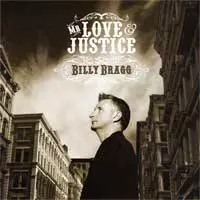My girlfriend calls it old people music; I call it brilliant. Old-school punk/folk troubadour Billy Bragg dropped Mr. Love and Justice this week, and while his style has mellowed out since 1983's Life's a Riot with Spy vs. Spy, there's no denying him his place among the best rock lyricists. Bragg has always walked a line between the personal and the political, and Mr. Love and Justice is just that. While the record tends to steer towards accounts about fidelity, Bragg still finds time for a socio-political jab here and there.
Musically, Bragg's style has shifted over the years. His voice, honest and British-y, is about the same, but all sorts of instruments have worked their way into his songwriting. Bragg's backing band, the Blokes, add a bluegrass/country twang to Bragg's Celtic/folk traditionalism. A noticeable increase in production quality might be distracting to some. It's weird; the album is by no means overproduced, but compared to a lo-fi masterpiece like Talking with the Taxman About Poetry, it might feel that way. Those who can't handle more than two instruments at a time might want to pick up Love's deluxe edition, which boasts a second version of the record with just Bragg and guitar. There are some noticeable arrangement differences, which makes it a worthwhile purchase for others as well.
But people don't come to Bragg solely for the music. They come for the lyrics. And man, does the guy deliver. The love songs are the ones that leave the strongest impression, and the way Bragg delivers word play like "Take the âM' for me and the âY' for you / Out of family and it all falls through" on "M for Me" ring true. Bragg sings about the importance of relying on one's significant other a lot here, like on "You Make Me Brave" or "Something Happened." There's a also a bit of paranoia about losing love, like on "If You Leave" or "I Almost Killed You," that show how fragile a relationship can be. Sometimes when things are going too well, we invent problems to complicate a love, something that Bragg taps into quite well here.
Bragg isn't all Mr. Love, though. There's still that Justice part, such as on "O Freedom," a simple protest song against government torture. A line as basic as "O Freedom / What liberties are taken in thy name" is packed with meaning when Bragg sings it, not to mention a wee bit of a double entendre in that freedom/liberty bit.
While I recommend this record to all, I especially want to point out "The Beach Is Free," a little ditty that every last New Jerseyian should check out. Enough with the beach tags already.
Mr. Love and Justice doesn't outshine Bragg's earlier work; Don't Try This at Home is still his crowning full-band accomplishment, in my eyes. And the political jibes occasionally miss -- "The Johnny Carcinogenic Show" is an anti-smoking anthem that depends heavily upon its title pun, even though Johnny Carson has been dead for three years and off the air for almost 16. But overall, it's a quality record all the same. A quarter of a century later, Bragg is still writing anthems, social critiques and emotional connections of the finest quality.
